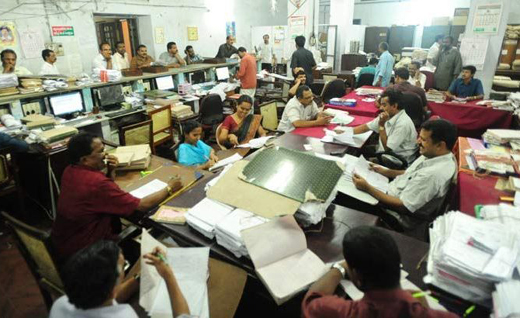Indian Bureaucracy’s Penchant for Grandiloquent and Intimidating Designations
Indian Bureaucracy’s Penchant for Grandiloquent and Intimidating Designations
Mangalore Today News Network
By Dr G ShreeKumar Menon
Manipal, August 9, 2019: Our honourable Prime Minister Shri Narendra Modi is reportedly engaged in an exercise to reform our bloated bureaucracy, and to make it people friendly. All government departments and the officers therein perform many different types of tasks of great importance to the citizens. The government administration comprises a wide number of different public authorities and institutions each with a different relationship with the citizens. For example, there is GST department that handles taxes, Police department that handles security related issues, and education department that deals with all educational institutions, educational policy, and, conduct of examinations and so on. Common to all of these authorities and institutions is the unwritten rule that they must treat citizens in a competent, proper and considerate manner.All officials and employees are expected to observe good administrative practices when dealing with citizens, as they are an expression of how public authorities, institutions and employees should conduct themselves with regard to citizens. Public authorities, institutions and employees generally demonstrate good administrative practice when they display politeness, consideration and attention towards citizens and act in a way that strengthens trust in the public administration. However, it is very common to see officials displaying high-handed behaviour, rudeness, arrogance and disdain for the general public. This partly emanates from the high sounding designations that many officials flaunt. Designations show off the power, rank and hierarchical position of the officer. Officials tend to self-estimate their importance by the designations, this belief is reinforced by the supplicating behaviour of their subordinates. Public are often overawed into shock and submission by high-sounding designations.

It is indeed the need of the hour for an A to Z transformation of the bureaucracy, starting with the intimidating designations found in each and every government office.The bureaucracy is still clinging on to archaic titles and designations that convey wrong notions about public administration, and government service. During the British era, titles and designations of government officials were meant to convey authoritarianism, brute power and, unfettered discretion in all matters. This warranted creation of grandiloquent designations that conveyed power and authority of all kinds. Hence the selection of designations like Commissioner, Chief Commissioner, Principal Chief Commissioner, Director General, Chief Secretary, Inspector General, Superintendent, Controller, Collector, and other similar high sounding words, which would invoke a certain kind of fear and dread in the minds of the common man. It is more than seventy years since the British left India, still our bureaucracy is clutching to these designations, which gives the officials heady notions of grandeur and authority over the common man.Is it not high time to make designations people friendly?
There are around 58 Ministries and 93 Departments in government of India, populated with thousands of officials flaunting high sounding designations in English language. Many designations when translated into Hindi and other regional languages, invariably carry the suffix “Adhikari” that denotes power.
The term ‘Public Servant’ encompasses all levels of government employees, from the highest to the lowest. Even the Legislature and the Judiciary are covered under the ambit of the term ‘Public Servant’. But, this term is hardly used in any government office. Instead, designations that create a climate of fear among the general public, is preferred. This also deludes the mind of the government official into forgetting that his salary and perks are paid by the tax payer. To quote Mortimer Zuckerman “Millions of public workers have become a kind of privileged new class - a new elite, who live better than their private sector counterparts. Public servants have become the public’s masters. No wonder the public is upset.” Any reform of the bureaucracy should first start with revamping of designations, and making them free of authoritarian terms, that denote an atmosphere of authority.The ‘public services’ aspect needs to be brought into the scope of every designation, in order to constantly remind the user of that designation that he is a ‘public servant’, first and foremost.
Government departments are rapidly transforming due to the advent of the digital era. Today, governance implies digital government, digital skills, data driven public sector, data governance and open government data. There is no scope for displaying authoritarianism when the system is rapidly transforming into digital mode, to become people friendly. Authoritarian designations and titles create psychological notions of power, authority and grandeur that inhibit an officer from being people friendly. The private sector, especially the IT sector realised the irrelevance of designations and quickly switched over to soft titles like Director, Head, Group Leader, Team leader, analysts, project lead, consultant, technical support executives and so on. These are very soft titles and give a hint of the scope of the duty involved in that post.However the designations of public officials are yet to change, in order to be relevant to the changing times.
The government should initiate a move to adopt soft titles, eradicate high-sounding authoritarian designations, introduce parity in designations across all departments, and while putting up boards in the reception area of each office that denote ‘List of Officers’, it should read as ‘List of Public Servants’. Media when reporting ‘news’ should make it a compulsory habit to use the term ‘Public Servant’ when reference is made to anybody, whether in the Legislature/Executive/ Judiciary. This would go a long way in making government departments citizen-friendly.
 Dr G Shreekumar Menon, IRS (Rtd) Ph.D. (Narcotics),
Dr G Shreekumar Menon, IRS (Rtd) Ph.D. (Narcotics),
Former Director General
National Academy of Customs Excise and Narcotics,
& Multi-Disciplinary School Of Economic Intelligence, India,
Fellow, James Martin Center For Non Proliferation Studies, USA.
Public Administration, Maxwell School of Public Administration, Syracuse University, U.S.A.
AOTS Scholar, Japan
He can be reached at www.shreekumarmenon.com
- Need For ‘Students, Alcohol and Drugs’ survey
- New Synthetic Drugs Trapping Youth
- Mood Modifying Chips - Future of Drug Use
- Ramping up Indo-Bangla border security
- IITM- A premier educational Institution in a forest. What can we learn?
- Former PM, Manmohan Singh: Notable laws passed under his tenure
- Hashish on Ratnagiri Seashore
- The Poor cry out to Us: Do we respond?
- Clandestine Meth Labs Sprouting Across India
- Hydro ganja from Bangkok latest craze among youth in India
- "Memories to Treasure" Dr.Michael Lobo’s new book
- Dominance of Private Universities: Will it make education inaccessible to underprivileged students?
- Monti Phest: A rich heritage of South Canara
- Kashmir Bhavan in Bengaluru: A must visit place
- "MAI and I" Book of Angelic Emotions
- Draupadi Murmu - The New ’President of India’
- Anthony Ashram in the city grows a classic museum
- First College of Fisheries in India - A Golden Jubilarian
- Flushing Meadows - A Vintage Mansion
- The Colonel’s Bequest
- A Mangalorean PM and his RBI Governor Brother: The Extraordinary story of the Benegal Brothers
- There is no higher religion than Truth: Theosophical Society
- L’affaire - Ashu & Yiju of Mangalore
- Mangalore in Kowloon
- 1568 to 2018 AD: 450 years of Christianity in Mangaluru
- Vice President elect Naidu moves on from nadir to zenith, the phenomenal journey
- Embracing the Outdoors: How Heated Jackets Are Revolutionizing Cold Weather Activities
- Efficient and Sustainable Packaging Solutions with FIBCs
- The Hybrid Kilt Revolution | Where Tradition Gets Trendy
- Affordable Elegance | Embrace Style on a Budget with Cheap Kilts
- Unleashing Style and Functionality | Exploring Tactical Kilts
- Mangalore’s Heroic Lady marks 105th Birthday
- Santa the Christmas spirit
- Geriatric care: Mangalore strikes a fine balance
- The Don Who Made Two Empires to Clash
- CHITRAPUR SARASWATS - A Great Kanara Community
- Our new President Ram Nath Kovind’s significant journey to Rashtrapathi Bhavan
- Marriages made in heaven, big fat weddings made in India
- Eid insight - The giver of glad tidings
- CITY INFORMATION
- TRAVEL
- TOURIST INFORMATION
- HEALTH CARE
- MISCELLANEOUS




 Write Comment
Write Comment E-Mail To a Friend
E-Mail To a Friend Facebook
Facebook Twitter
Twitter  Print
Print 


